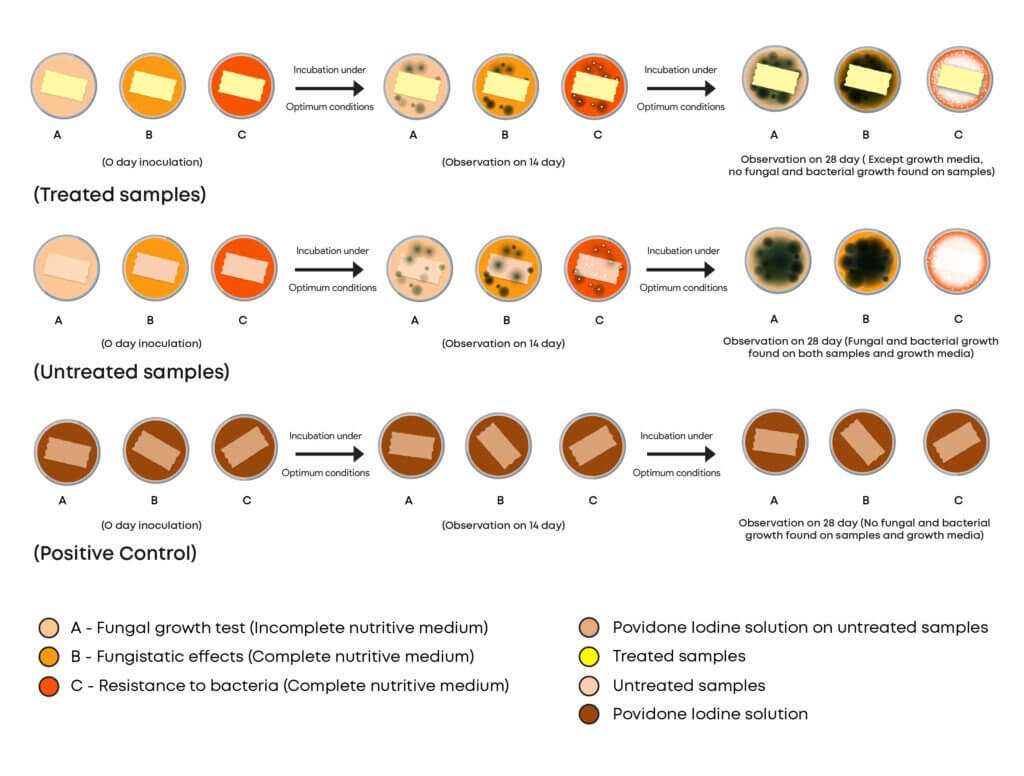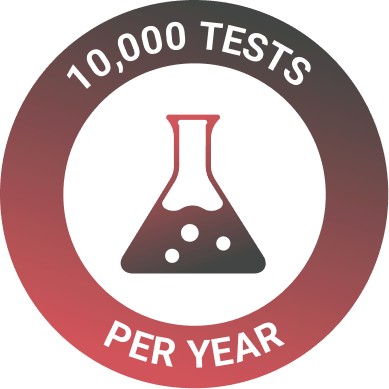Home >> ISO 846
ISO 846 : 1997 – Evaluation of the Action of Micro-organisms on Plastics
ISO 846 determines the deterioration of plastics due to the action of fungi, bacteria, and soil microorganisms.
Colonization of micro-organisms on plastic surfaces is usually triggered by extrinsic factors such as temperature, relative humidity, and gaseous environments. The deterioration of plastic materials by microorganisms (bacteria and fungus) is affected by two processes –
- Direct action – Plastics act as a nutrient medium for the growth of microorganisms. This subsequently results in the deterioration of plastic.
- Indirect action – Metabolic products of microorganisms cause the deterioration of plastic.
The above-explained processes ultimately affect the physical properties and functioning of products along with decreased shelf life. ISO 846 test method is developed to check the deterioration of non-porous plastic materials against a set of test microorganisms using parameters like visual examination, changes in mass, or changes in other physical properties. However, this test is not intended to check the biodegradability of plastic materials.
- Bacteria: Pseudomonas aeruginosa (ATCC 15442)
- Fungi: Aspergillus niger van Tieghem (ATCC 6275), Penicillium funicu/osum Thom (CMI 114933), Paecilomyces variotii Bainier (ATCC 18502), Gliocladium virens Miller et al. (ATCC 9645), and Chaetomium globosum Kunze: Fries (ATCC 6205).

ISO 846 Test Methods
- Method A – Fungal growth test
Treated plastic samples are exposed to a mixed suspension of fungal spores containing insufficient nutritive medium (without a carbon source). After the exposure period, if the treated sample does not contain any nutritive components, then fungus can’t grow on the material and cause any sort of deterioration.
- Method B – Determination of Fungistatic Effects
Treated plastic samples are exposed to a mixed suspension of fungal spores containing a complete nutritive medium (with a carbon source). Inhibition of the growth of fungus on the plastic and in the growth medium, shows the fungistatic activity of the treated plastic samples.
- Method C – Resistance to Bacteria
Treated samples are inoculated with test bacteria on an incomplete medium and kept for incubation. After incubation, if there is no growth in the medium around the treated sample, then it indicates that the specimen does not contain any nutritive components.
- Method D – Soil Burial
Soil Burial is proposed to check the deterioration of plastic materials that are used in permanent contact with soil. In this method, test specimens are completely buried in natural soil with a known water-holding capacity and under specific humid and pH conditions.
In addition to ISO 846 microbial testing for plastics, MIS performs other testing methods such as ISO 22196, JIS Z 2801, and ISO 21702 to check the antimicrobial efficacy of treated plastic materials.
Microbe investigations provides antimicrobial testing services for a variety of products that claim microbial protection. We are specialized in assessing the antimicrobial efficacy of textiles, disinfectants, and coating materials.
MIS uses a state-of-the-art microbiology testing facility that allows our professionals to carry out quality investigations of antimicrobial samples and deliver the analysis reports in line with International Standards. For more information on ISO 846 or other antimicrobial plastic testing services, contact us here.
FAQs
ISO 846 is an international standard used to determine the deterioration of plastics due to the action of fungi, bacteria, and soil microorganisms.
ISO 846 test is applicable for non-porous plastic materials such as roofing membranes, storage containers, vinyl siding, medical devices, and ceramics.
ISO 846 test takes 28 days to complete.
At Microbe Investigations, we test for the ISO 846 using the following bacterial and fungal strains: Pseudomonas aeruginosa (ATCC 15442) and Aspergillus niger (ATCC 16888). Other strains can also be added as per customer’s request.
Contact us for more information
Explore Other Tests
ASTME2149 | AATCC-100 | JISZ2801 | JISL1902 | EN 1276 | ISO 22196 | ISO 20743 | ISO 846 | ASTM E2180 | AATCC 147 | ASTM D7907-14 | ASTM E3031 | ASTM G29 | EN 16615 | EN 13697 | PAS 2424 | EN 1040 | EN 14349 | EN 13727 | EN 14561 | ASTM G22 | ASTM E1153 | ASTM D2574 | AATCC 174 | EN 14563 | EN 13704 | EN 1499 | EN 1500 | EN 14347 | EN 14348 | EN 1656 | EN 16437 | EN 12791 | ASTM E1174 | ASTM E2362
Antifungal Testing
AATCC 30 | ASTM G21 | EN 1650 | EN 1657 | EN 13624 | EN 1275 | ASTM C1338 | ASTM D5590






